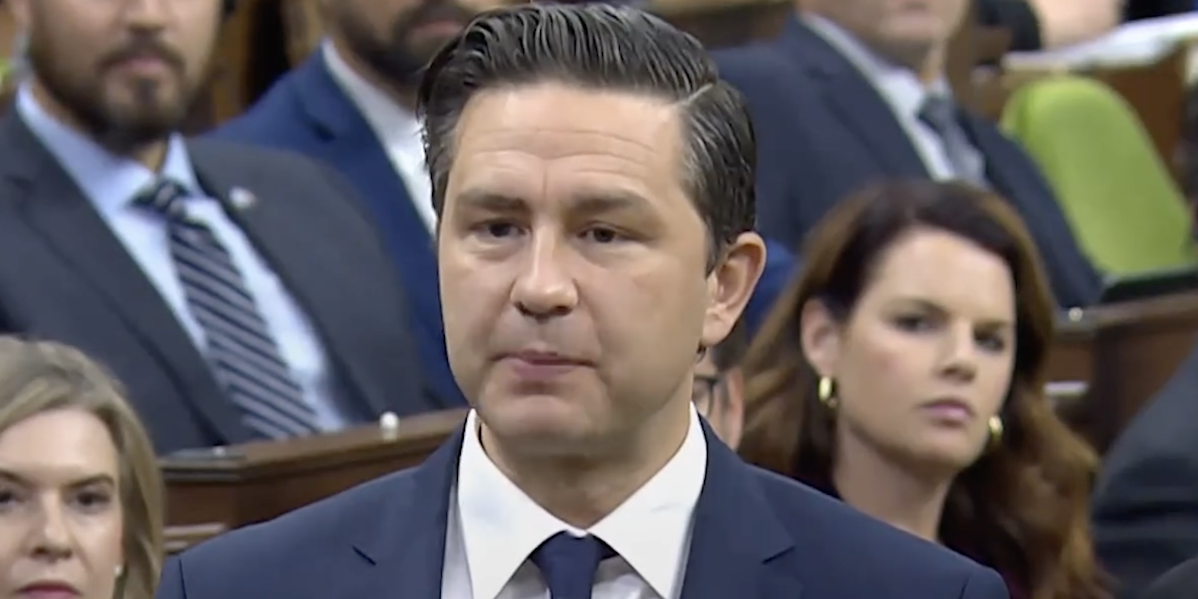So let me get this straight. Pierre Poilievre is going to make life more affordable for Canadians. Yet he’s going to ramp up our military spending wildly, as demanded by Donald Trump.
Trump isn’t even yet the Republican nominee (and still faces 91 criminal charges) but already our putative future prime minister is bending to his will.
Last week, Poilievre indicated support for boosting Canada’s military spending to two per cent of GDP, right after Trump told a rally he’d encourage Russia to “do whatever the hell they want” to any NATO country that doesn’t meet NATO’s two per cent target.
Of course, bowing and scraping to the MAGA boss-man isn’t the image Poilievre wants to project to Canadians. He wants us to see him as a scrappy tough guy who fights to make our lives more affordable.
The problem is he doesn’t come up with any ideas that would actually make our lives more affordable. Sure, he talks about “axing the tax” (very scrappy) but always leaves out the kicker: eliminating the carbon tax would also mean eliminating the rebate that leaves most Canadians better off (not so scrappy).
Axing the tax certainly appeals to Big Oil boosters who want to keep us hooked on fossil fuels, but it won’t help with affordability.
Meanwhile, raising our military spending to two per cent of GDP — from its current level of 1.39 per cent — would cost us an extra $25 billion a year, according to Canada’s Parliamentary Budget Office. That would please Trump (at least for a moment). But such a massive spending hike would inevitably result in spending cuts to things we really need — like health care, transit, housing — making our lives worse and less affordable.
Trump’s resurgence in the US has revived grumbling from right-wing commentators here that our military spending is too low. But it isn’t. If anything, it’s too high.
Canada is the sixth largest military spender among NATO’s 30 members and we’ve committed to spending an additional $553 billion over the next 20 years, notes retired Canadian senator Douglas Roche, a former Ambassador for Disarmament. Roche argues we should be cutting planned military spending by 10 per cent.
Now there’s an argument you rarely see in the media, even though it’s in sync with the 93 per cent of Canadians who, according to Global TV’s latest Ipsos poll, rank the military at almost the bottom of their priorities, barely above “don’t know.”
Roche, a former Progressive Conservative parliamentarian from Alberta, insists Canada should instead put an extra $2 billion into the UN’s Sustainable Development Goals.
Commentators portray Canada as a small military spender because, like Trump, they measure military spending as a percentage of GDP, rather than in actual dollars.
This makes our military spending look smaller, says Steven Staples, an analyst and writer for PeaceQuest.”
Yet, when we assess the military spending of our enemies, we tend to use actual dollar amounts, which makes their spending look bigger and therefore more of a threat — a threat that presumably must be countered with higher military spending on our part.
Staples insists dollar amounts are the best measure of a country’s firepower, and, by that measure, Canada’s annual $29 billion military spending puts us among top NATO spenders, right behind countries that have nuclear weapons or host them.
Of course, the real problem with military spending is that it’s way too high, driven by Washington’s bloated $877 billion annual Pentagon budget — larger than the 10 next biggest military spenders combined — stoking an arms race and ensuring the world’s resources are squandered on weaponry.
And no amount will ever be enough to satisfy Trump, who has the interests of US military contractors at heart (cold as it is). Trump has already shown an appetite for raising the NATO military spending requirement to four per cent of GDP.
Let’s hope we end up with a prime minister who responds with more than “As you wish, sir.”
This article was originally published in the Toronto Star.



